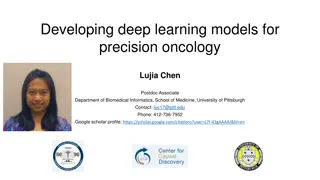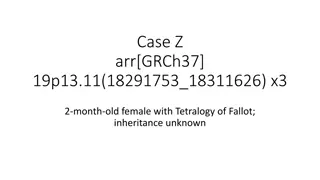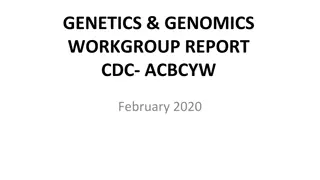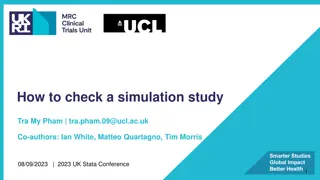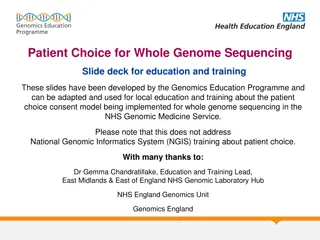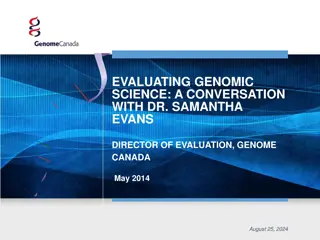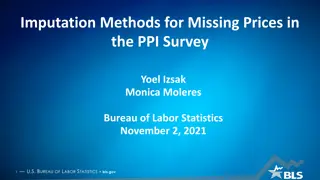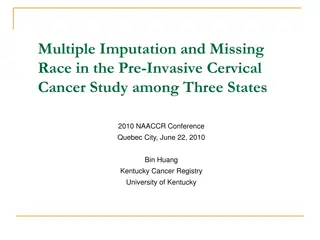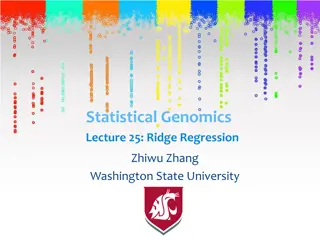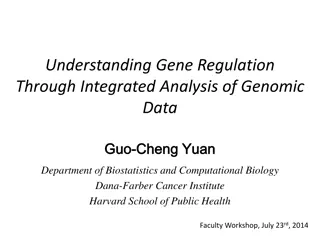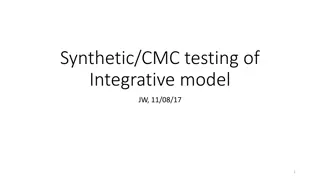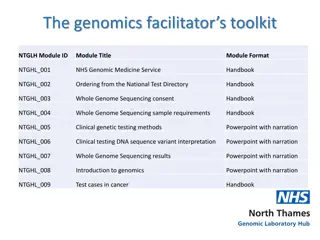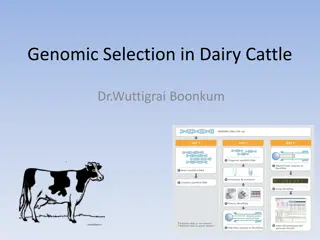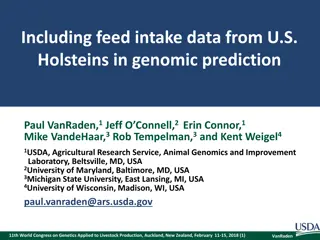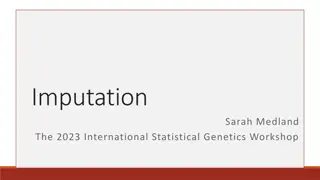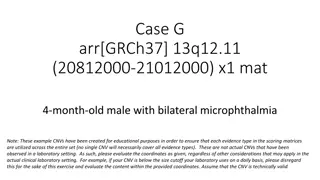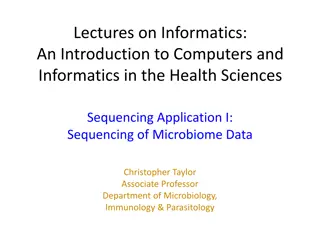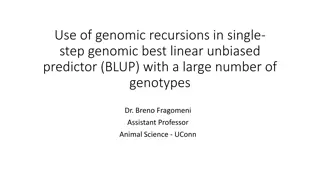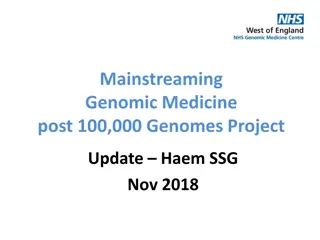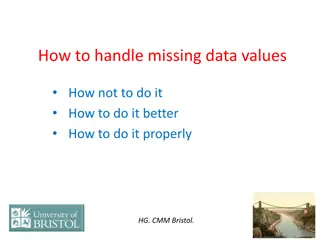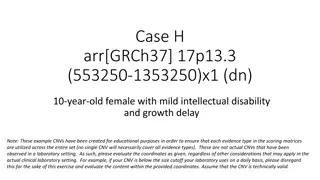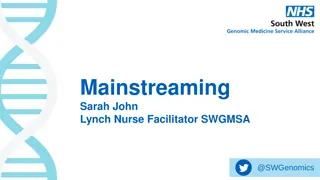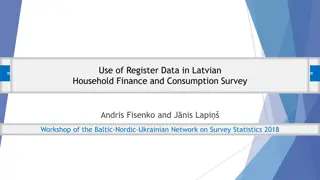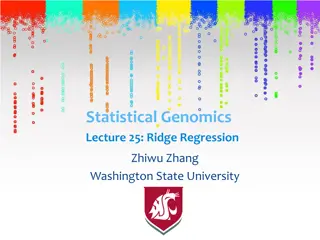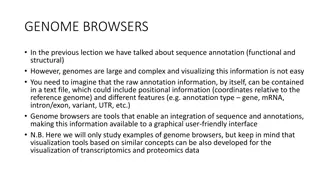Generalizing Research on Older Adults in Seattle Integrated Health System
This research project led by Laura Gibbons focuses on generalizing findings from the Adult Changes in Thought (ACT) study in a Seattle integrated health delivery system to all older adults in the region. By comparing ACT participants with the current Seattle area population and using survey weights
1 views • 29 slides
Genomic Inference of Human Population Size Changes Over Time
Explore the genomic inference of a severe human bottleneck during the Early to Middle Pleistocene transition, tracing the evolution of hominins over the last 4 million years, and studying essential events in the emergence of humans in the last one million years. Discover well-known human population
4 views • 33 slides
Latest Developments in Genomic Medicine and NHS Genomic Strategy
The genomic medicine field is advancing rapidly, with a focus on enhancing healthcare services through genomic testing for prediction, prevention, diagnosis, and precision medicine. The NHS is actively integrating genomics into its healthcare system, aiming for equitable access to genomic testing. I
1 views • 16 slides
Precision Oncology Research using Deep Learning Models
Lujia Chen, a Postdoc Associate at the University of Pittsburgh, focuses on developing deep learning models for precision oncology. By utilizing machine learning, especially deep learning models, Chen aims to identify cancer signaling pathways, predict drug sensitivities, and personalize cancer trea
1 views • 5 slides
Lab 2: DNA Extraction Techniques for Arthropods and Wolbachia
In this lab activity, students will learn how to isolate genomic DNA from arthropods and Wolbachia bacteria. The goal is to transition from fieldwork to molecular biology, utilizing DNA as a diagnostic tool. The activity involves extracting total genomic DNA from identified species and includes pre-
0 views • 11 slides
Genomic Evaluation of a 2-Month-Old Female with Tetralogy of Fallot
This case involves a 2-month-old female with Tetralogy of Fallot, carrying a genetic variation in the 19p13.11 region. The evaluation process includes assessing genes, known dosage sensitivity, gene count, and detailed analysis of the duplication found in the DGV Gold Standard Dataset. The frequency
0 views • 17 slides
Understanding Defamation Laws in Indian Penal Code 1860 Section 499
Indian Penal Code Section 499 defines defamation as making or publishing any imputation concerning a person intending harm or knowing it will harm their reputation. The section includes explanations regarding imputations towards deceased individuals, companies, and ironic expressions. To constitute
0 views • 10 slides
Understanding Challenges and Gaps in Genetic and Genomic Testing for Breast Cancer Risk
The report highlights current challenges and identified gaps in genetic and genomic testing for breast cancer risk assessment. The workgroup aims to catalog existing materials, address terminology confusion, and improve public and clinician education. Challenges include complex terminology, uncertai
0 views • 21 slides
How to Check a Simulation Study: Methods and Considerations
Simulation studies are often used to evaluate statistical methods and study power, but they can sometimes produce misleading results. This work discusses strategies to assess and improve the quality of simulation studies, drawing on experiences and considerations outlined in relevant literature. A s
0 views • 31 slides
Molecularly-Guided Therapy vs Platinum Chemotherapy in CUP Patients
This trial aims to compare the efficacy and safety of molecularly-guided therapy or cancer immunotherapy based on genomic profiling with platinum-based chemotherapy in patients with cancer of unknown primary site. The study design includes multiple treatment regimens guided by genomic profiles, with
4 views • 9 slides
Patient Choice for Whole Genome Sequencing in NHS: Education & Training Slide Deck
Developed by Genomics Education Programme, these slides focus on the patient choice consent model for whole genome sequencing in NHS Genomic Medicine Service. The model aims to ensure informed choices for genomic testing, including participation in the National Genomic Research Library. It covers se
0 views • 34 slides
Evaluating Genomic Science: Insight into Genome Canada's Mission and Impact
This conversation with Dr. Samantha Evans, Director of Evaluation at Genome Canada, delves into the importance of program evaluation in genomic science. Genome Canada aims to connect ideas, invest in science and technology, and maximize impacts across sectors. The evaluation process involves collect
0 views • 36 slides
Advanced Imputation Methods for Missing Prices in PPI Survey
Explore the innovative techniques for handling missing prices in the Producer Price Index (PPI) survey conducted by the U.S. Bureau of Labor Statistics. The article delves into different imputation methods such as Cell Mean Imputation, Random Forest, Amelia, MICE Predictive Mean Matching, MI Predict
0 views • 22 slides
Understanding Food Processing Data for Balance Sheets
Food processing data is crucial for balance sheets, necessitating the consideration of official and alternative sources, as well as approaches for imputation and estimation. Industrial output surveys, agricultural production surveys, and data from commodity organizations play key roles in determinin
0 views • 11 slides
Addressing Missing Race Data in Pre-Invasive Cervical Cancer Study
Study discusses missing race data in pre-invasive cervical cancer cases among three states and the impact on analysis. It highlights the concept of multiple imputation to handle missing data effectively, providing insights into data mechanisms and methods to treat missing values.
0 views • 25 slides
Precision Oncology and Genomic Changes in Cancer Treatment
Explore the intricate details of cancer treatment through precision oncology, focusing on cell of origin, genomic changes, tumor microenvironment, host factors, and response to various treatments such as chemotherapy, biological therapy, and immune therapy. The natural history and histology-guided c
0 views • 9 slides
Understanding Ridge Regression in Genomic Selection
Explore the concept of ridge regression in genomic selection, involving the development of genomic selection methods, pioneers in implementation, fixed and random effects, and the over-fitting phenomenon. Learn how ridge regression addresses issues of over-fitting by introducing regularization param
0 views • 26 slides
Understanding Industrial Use of Agricultural Products
This session explores industrial uses of agricultural products, focusing on data sources and methodologies for imputation and estimation. It emphasizes the importance of consulting industry experts and official data sources to capture industrial utilization accurately. The session also highlights th
0 views • 11 slides
Understanding Seed Use Data: Imputation and Estimation Methods
Explore different data sources for seed use, learn recommended approaches for imputation and estimation, understand definitions, and delve into the significance of seeding rates in calculating total seed use quantities.
0 views • 24 slides
Decoding the Hidden Regulatory Codes Shaping Protein Evolution
The study explores the intricate relationship between genetic and regulatory codes that shape protein evolution. Discusses how duons, genomic footprints, and transcription factors densely populate and constrain protein-coding exons. Highlights how regulatory elements influence codon choice independe
0 views • 21 slides
Insights into Gene Regulation through Genomic Data Analysis
Explore the intricate world of gene regulation and genomic data analysis through a comprehensive study presented at a faculty workshop in 2014. Delve into the evolution and classification of biology, the impact of genome sequencing on digitizing biology, and the potential of genetic information vari
0 views • 18 slides
Overview of Synthetic Models in Transcriptional Data Analysis
This content showcases various synthetic models for analyzing transcriptome data, including integrative models, trait prediction, and deep Boltzmann machines. It explores the generation of synthetic transcriptome data and the training processes involved in these models. The use of Restricted Boltzma
0 views • 14 slides
Genomics Facilitator's Toolkit Summary & Sample Requirements
This toolkit provides essential resources for healthcare professionals involved in genomics services, covering topics such as genomic medicine, whole genome sequencing, clinical genetic testing methods, interpretation of DNA variants, and more. It also details the specific sample requirements for di
0 views • 24 slides
Genomic Selection in Dairy Cattle: Advantages, Disadvantages, and Impact
Genomic selection in dairy cattle focuses on specialized breeds like Holstein, Jersey, Brown Swiss, and Ayrshire. It brings reliable breeding values at a young age, higher success rates in obtaining top bulls, and lower costs for test proofs, leading to a shorter generation interval. While it offers
0 views • 12 slides
Understanding Food Balance Sheets: Data Sources and Imputation
Explore the world of food balance sheets, focusing on data sources for feed and recommended approaches for imputation and estimation. Discover definitions, official and alternative data sources, and the importance of cross-checking feed production with livestock demands.
0 views • 19 slides
Genomic Prediction of Feed Intake in U.S. Holsteins
This study discusses the inclusion of feed intake data from U.S. Holsteins in genomic prediction, focusing on residual feed intake (RFI) as a new trait. The research involves data from research herds and genotypes of cows, with genetic evaluation models and genomic evaluation for predicting feed int
0 views • 17 slides
Genomic Imputation Pipeline Overview
This document outlines a genomic imputation pipeline for multiple GWAS studies using reference panels such as 1000 Genomes Phase I data. It covers steps like data matching, phasing, and imputation using tools like Beagle and Minimac. The expected output includes imputed dosages and quality measures.
0 views • 6 slides
Understanding Imputation in Statistical Genetics Workshop
Exploring the concept and reasons for imputation, this workshop delves into fine mapping, genotyping, and more through detailed explanations and visual aids. Topics cover the process of imputation, data genotyping, QC, references, and the practical application of imputation in genetic studies.
0 views • 39 slides
Evaluation of Genomic Deletion in a 4-Month-Old Male with Bilateral Microphthalmia
Clinical assessment was conducted on a 4-month-old male with bilateral microphthalmia due to a genomic deletion in the 13q12.11 region. The deletion encompasses part of a protein-coding gene and has been associated with various birth defects and developmental delays in previous cases. Detailed evalu
0 views • 13 slides
Introduction to BED Files: An Overview of Browser Extensible Data Format
BED (Browser Extensible Data) files are commonly used for annotating genomic sequences by specifying ranges on chromosomes. They consist of required fields like chromosome name, start and end positions, and optional fields for additional information such as name, score, strand, and color representat
0 views • 11 slides
Understanding China's Economic Growth Through Macroeconomics Analysis
Explore the intricate details of China's GDP evolution, real GDP growth, and the concepts of intermediate macroeconomics. Dive into the circular flow, GDP imputation, deflators, and more as you analyze China's economic performance from 1953 to 2022. Uncover the interplay between nominal and real GDP
0 views • 58 slides
Genomic Recursions in Genomic BLUP for Animal Breeding
Explore the application of genomic recursions in single-step genomic best linear unbiased predictor (BLUP) for genetic evaluations in animal breeding. Understand the significance of using genomic data to improve genetic selection, increase accuracy, shorten generation intervals, and enhance genetic
0 views • 31 slides
Mainstreaming Genomic Medicine: 100,000 Genomes Project Update
The Mainstreaming Genomic Medicine post provides insights into the background and progress of the 100,000 Genomes Project, including details on genetic vs. genomic testing, the setup of NHS Genomic Medicine Centres, types of cancer included, and samples taken. It covers the project's inception, key
0 views • 19 slides
Efficient Techniques for Handling Missing Data Values
Explore effective methods for handling missing data values, including what not to do and how to improve imputation techniques. Discover the drawbacks of common approaches and learn better strategies to enhance accuracy and reduce bias in data analysis.
0 views • 14 slides
Genetic Analysis of 17p13.3 Deletion in a 10-Year-Old Female
This genetic case study involves a 10-year-old female with a de novo 17p13.3 deletion, presenting with mild intellectual disability and growth delay. The deletion overlaps with the Miller-Dieker syndrome critical region, impacting genes associated with lissencephaly and cognitive impairment. Through
0 views • 19 slides
Understanding Mainstreaming in Genomic Testing for Lynch Syndrome
Mainstreaming in healthcare involves shifting genomic testing from Clinical Genetics to various specialties, such as cancer MDTs. This process impacts consent for genetic testing and result communication. NDRS data analyzes the time to diagnosis, while training and resources focus on why mainstreami
0 views • 7 slides
Insights into Latvian Household Finance and Consumption Survey
The Latvian Household Finance and Consumption Survey gathers micro-level structural data on households' assets, liabilities, economic decisions, demographics, employment, and more. This joint project includes 18 European countries and involves sampling, data collection, editing, and imputation at th
0 views • 25 slides
Concept Development and Implementation of Ridge Regression in Genomic Selection
This presentation delves into the concept development and implementation of ridge regression in genomic selection, emphasizing the importance of avoiding overfitting by regulating parameters and distinguishing between fixed and random effects. The pioneers of ridge regression and Bayesian methods ar
0 views • 26 slides
Risk Management and Contingency Planning in Canadian Census Program
Effective risk management and contingency planning were vital for the Canadian Census of Population Program in December 2022. Prior to operations, risks were identified, evaluated, and mitigation plans were established. During operations, a virtual operational command center was utilized due to COVI
0 views • 7 slides
Understanding Genome Browsers and their Significance in Genomic Research
Genome browsers are essential tools for visualizing complex genome information, integrating sequence data with annotations in a user-friendly graphical interface. They enable exploration of chromosomal regions, regulatory elements, and comparative genomics across different organisms. Key examples in
0 views • 24 slides



